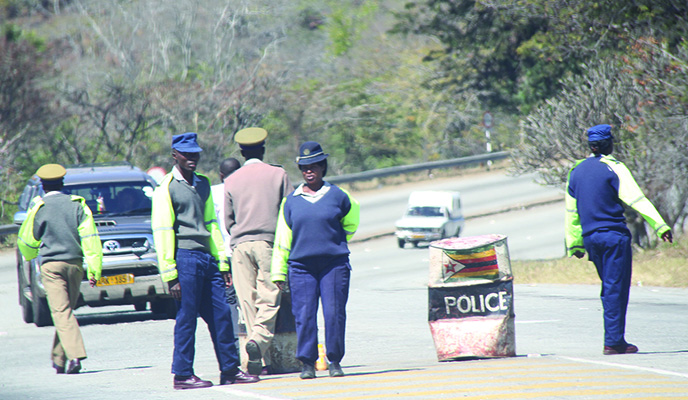In a stunning development, the Zimbabwe Republic Police collected $14 million from its unpopular roadblocks and arrested more than one million traffic offenders in the first six months of this year, documents in our possession show.

Apart from raking in the staggering millions of dollars, police also collected R11 717 900 during the 178 days which it reviewed on June 27 and 28, 2017 in a report broken down to show how much police stations and highway patrol teams had billed in the first six months.
The figures are carried in a memorandum compiled by Officer Commanding National Traffic and sent to police chiefs and relevant heads in a review of fines, arrests and targets carried in the first 178 days of 2017.
Curiously, the report mentioned that police officers manning the roadblocks and carrying spot checks were failing to meet their targets due to many roadblocks, especially in Harare.
During the 178 days police arrested 1 038 657 million people, a gigantic figure representing the efforts of both the police stations and highway patrol teams. Police stations arrested 541 566 and highway patrol teams nailed 497 091.
In monetary terms, Harare province was the biggest earner with police stations themselves contributing $2 382 230, followed by Midlands which had $691 910 and Mashonaland West with $615 335.
Highway Patrol in Harare earned $3 707 170 during the same period with Mashonaland West province receiving $617 810, followed by Midlands province with $542 430.
In total, police stations raked in $6 611 425, R3 168 690 and (Botswana Pula) P52 300.
The Highway Patrol earned $7 778 030, R8 549 210, Euro10 and P 540.
During the 178 days under review, Harare Central Police Station and Mutare had a daily target of $3 000 followed by Chitungwiza, $2 500, and Mabvuku, $2 100.
Highway Patrol teams were demanded to meet targets ranging between $1 300 and $1 800 per day.
The latest revelations come as there are growing calls for government to reduce the number of roadblocks by thousands of motorists who complain about the random and unrelenting harassment at by police.
Apart from complaints of harassment by the motoring public, the many roadblocks have been blamed for driving away international tourists.
Speaker of National Assembly Jacob Mudenda and Tourism minister Walter Mzembi are among those who have been critical of the many roadblocks and so called spot checks.
Vice President Emmerson Mnangagwa recently implored Home Affairs minister Ignatius Chombo to sort the issues of roadblocks and spot checks with Mzembi, but despite promising that they would be reduced, police has actually increased them.
Police has repeatedly argued for more punitive measures on the roads such as increasing spot fines with police commissioner-general Augustine Chihuri in February calling for a steep hike to stem road crime and carnage.
Chihuri was addressing parliamentarians who sit in portfolio committee on Transport and Infrastructural Development who were touring the law enforcement agency’s transport management and computerisation centre at Chikurubi.
“The fines are such that once you pay, you forget it. Take for example in Germany, if you commit an offence, they take all your number plates and for you to get one plate (back), you need to fork out $10 000, which is $20 000 for the two,” Chihuri told the lawmakers then.
“I think for us, the number of people who commit road offences will continue to increase because of small fines. Yes, spikes are legal. . . spot fines are also legal. People forget that as police, we need to be protected from criminals. Everyone sees our mistakes because we work with people all the time,” he said.
Chihuri’s sentiments came after Finance minister Patrick Chinamasa in the 2017 budget hiked standard fines — which were last reviewed in February 2009 — by up to 100 percent with effect from January 1.
Chinamasa, like Chihuri, also argued that the penalty structure had been found to be ineffective, given the rising road fatalities that were largely attributed to the failure by motorists to observe road rules.
On the other hand, in February in February the High Court ruled that there was no law that allowed police to confiscate licences and impound vehicles of drivers who refused to pay spot fines.
This was after police had admitted that they had no right to force drivers to pay spot fines.
Ordinary Zimbabweans and motorists have also blamed rampant corruption at these roadblocks and spot checks with the Road Users Association threatening to file a complaint at the Constitutional Court.
Home Affairs deputy minister Obedingwa Mguni unwittingly exposed the corruption by traffic police officers recently when he told Parliament that he had received requests from MPs to facilitate their children transfers to traffic department.
“I have received more than four requests from Members of Parliament and they are asking me to say ‘my son or my daughter is in the police force, he wants to be transferred to the traffic.’
“I have told Levy Sibanda, who is Deputy commissioner-general for Human Resources that here are the names of daughters and sons of MPs who want to be transferred to traffic. Can you interview them why they want to be transferred to traffic, what is the reason?
“The reason has been ‘my wife is far from me,’ ‘I see Bulawayo traffic is near, where there is space can I be accommodated,’
“There are a lot of even community leaders who want their sons to go and work in traffic. You wonder why, what is the reason? Here, we have to correct everything to eradicate this (corruption) crime.” Mguni said while giving oral evidence to Parliamentary Portfolio Committee on Transport and Infrastructural Development. Daily News






